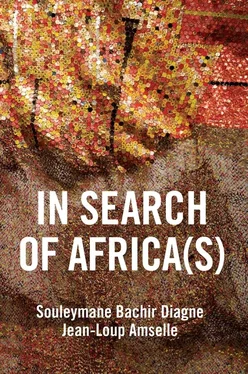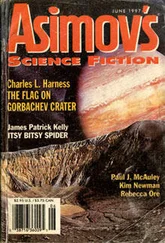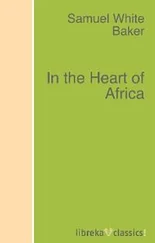21 21. ‘Emotion is Negro, as reason is Hellenic.’ In Diagne’s view, these are two forms of thought found in all cultures. Personally, I sense the influence of Gobineau here – though, from my point of view, this is by no means to denigrate Senghor’s thought. See Souleymane Bachir Diagne, ‘Penser de langue à langue’, in Alain Mabanckou (ed.), Penser et écrire l’Afrique aujourd’hui (Paris: Le Seuil, 2017), p. 74.
22 22. ‘If a philosophy of the future exists, it will have to be born outside of Europe, or as a consequence of the encounters […] between Europe and non-Europe,’ quoted in Jeremy R. Carrette (ed.), Religion and Culture: Michel Foucault (New York: Routledge, 1999), p. 113.
23 23. Merleau-Ponty, ‘Everywhere and Nowhere’, in Signs, p. 139. See also Anthony Mangeon (ed.), Anthropolitiques: Jean-Loup Amselle, une pensée sans concessions (Paris: Karthala, 2015), p. 8, note 1.
24 24. See Amselle, L’Occident décroché on the connections between primitivism and postcolonialism.
25 25. I am drawing here on the analysis of Levinas’s work in Jean-Marc Narbonne,Levinas et l’héritage grec (Paris: Vrin and Presses de l’Université Laval, 2004), pp. 90, 111, 112, 116 (quotation from pp. 111–12).
26 26. Emmanuel Levinas, Humanism of the Other, translated by Nidra Poller (Urbana: University of Illinois Press, 2003), p. 60 (translation modified).
27 27. Gottfried Wilhelm Leibniz, ‘Monadology’, in Leibniz, Discourse on Metaphysics and other Essays, translated by Danile Garber and Roger Ariew (Indianapolis, IN: Hackett, 1991). On Diagne’s thought as a kind of theology, see Anthony Mangeon, La Pensée noire et l’Occident (Cabris: Sulliver, 2010), p. 141.
28 28. On the ‘opacity’ of cultures, as Édouard Glissant puts it, see his Le Discours antillais (Paris: Gallimard, 1997). On Barbara Cassin’s views on ‘untranslatability’, see Entretien avec Barbara Cassin réalisé par Colette Briffard, http://www.revue-texto.net/Dialogues/Cassin_interview.html; see also Barbara Cassin (ed.), Dictionary of Untranslatables: A Philosophical Lexicon, translated by Steven Rendall et al. (Princeton, NJ: Princeton University Press, 2014) and her Éloge de la traduction: compliquer l’universel (Paris: Fayard, 2016). François Jullien puts forward in his many different books the view (close to that of Merleau-Ponty) that European culture can be observed ‘from’ the standpoint of Chinese culture.
29 29. Eric Hobsbawm and Terence Ranger (eds), The Invention of Tradition (Cambridge: Cambridge University Press, 1983).
30 30. Eduardo Viveiros de Castro, ‘Perspectivism and Multinaturalism in Indigenous America’, in Alexandre Surrallés and Pedro García Hierro (eds), The Land Within: Indigenous Territory and Perception of the Environment (Copenhagen: IWGIA, 2005).
31 31. Laure Noualhat, ‘Attac: Pachamama mia!’, Libération, 23 August 2010, https://www.liberation.fr/terre/2010/08/23/attac-pachamama-mia_673655; Ramón Grosfoguel, ‘Decolonizing Postcolonial Studies and Paradigms of Political Economy: Transmodernity, Decolonial Thinking, and Global Modernity’, http://dialogoglobal.com/texts/grosfoguel/Grosfoguel-Decolonizing-Pol-Econ-and-Postcolonial.pdf. See also the article by Maëlle Mariette, ‘À la recherche de la Pachamama’, Le Monde diplomatique, March 2018, https://www.monde-diplomatique.fr/2018/03/MARIETTE/58464.
32 32. Jean-Loup Amselle and Elikia M’Bokolo (eds), Au coeur de l’ethnie: ethnies, tribalisme et État en Afrique (Paris: La Découverte, 1999).
33 33. Jean-Loup Amselle, Mestizo Logics: Anthropology of Identity in Africa and Elsewhere, translated by Claudia Royal (Stanford, CA: Stanford University Press, 1998).
34 34. Jean-Loup Amselle, Branchements: anthropologie de l’universalité des cultures, 3rd edn (Paris: Flammarion, 2015).
35 35. See the interesting debate that I had with Diagne at the ‘Cité Philo’ (Lille, November 2014) and which was rebroadcast as part of the ‘Chemins de la connaissance’ (‘Paths of Knowledge’) series: the topic was whether Africa invented human rights (‘Penseurs d’Afrique [2/5]: L’Afrique a-t-elle inventé les droits de l’homme’, https://www.franceculture.fr/emissions/les-nouveaux-chemins-de-la-connaissance/penseurs-d-afrique-25-l-afrique-t-elle-invente-les).
36 36. As well as my Mestizo Logics and Branchements, see my Rétrovolutions: essais sur les primitivismes contemporains (Paris: Stock, 2010).
37 37. See Dominique Franche, Généalogie du génocide rwandais (Paris: Tribord, 2004).
38 38. Michel Foucault, Society Must be Defended, edited by Mauro Bertani and Alessandre Fontana; translated by David Macey (London: Penguin, 2003).
39 39. ‘By reconnecting with the deep meaning of Marx’s doctrine, one should be able to recover not only the meaning of capital as a social relationship, but also as a magical relationship, the one that appears in Marx in connection with “commodity fetishism”. Considering the commodity as a fetish represents a truly revolutionary approach as it gives this representation the truly anthropological dimension of witchcraft, itself seen as a belief system. Seeing the commodity as a fetish involves considering the commodity as an idol, a kind of Golden Calf to which we sacrifice’ (Jean-Loup Amselle, L’Anthropologue et le Politique [Paris: Lignes, 2012], pp. 104–5).
40 40. See Luis Martínez Andrade, ‘Le capitalisme comme religion: la théologie de la libération au tournant décolonial’, in Ali and Dayan-Herzbrun (eds), Pluriversalisme décolonial, pp. 92–3.
41 41. Dipesh Chakrabarty, Provincializing Europe: Postcolonial Thought and Historical Difference (Princeton, NJ: Princeton University Press, 2000).
42 42. Souleymane Bachir Diagne, ‘Du mouvement vers l’universel’, de(s)générations, no. 22: ‘Penser avec l’Afrique’, 2015, pp. 25–6.
43 43. Diagne, ‘Du mouvement vers l’universel’.
44 44. Jean-Loup Amselle, ‘De la déconstruction de l’ethnie au branchement des cultures’, Actes de la recherche en sciences sociales, no. 185, 2010, pp. 96–113.
45 45. Indigènes de la République (Indigenous of the Republic) is the name of an anti-imperialist and anti-racist French political party. (Translator’s note.)
Конец ознакомительного фрагмента.
Текст предоставлен ООО «ЛитРес».
Прочитайте эту книгу целиком, на ЛитРес.
Безопасно оплатить книгу можно банковской картой Visa, MasterCard, Maestro, со счета мобильного телефона, с платежного терминала, в салоне МТС или Связной, через PayPal, WebMoney, Яндекс.Деньги, QIWI Кошелек, бонусными картами или другим удобным Вам способом.












